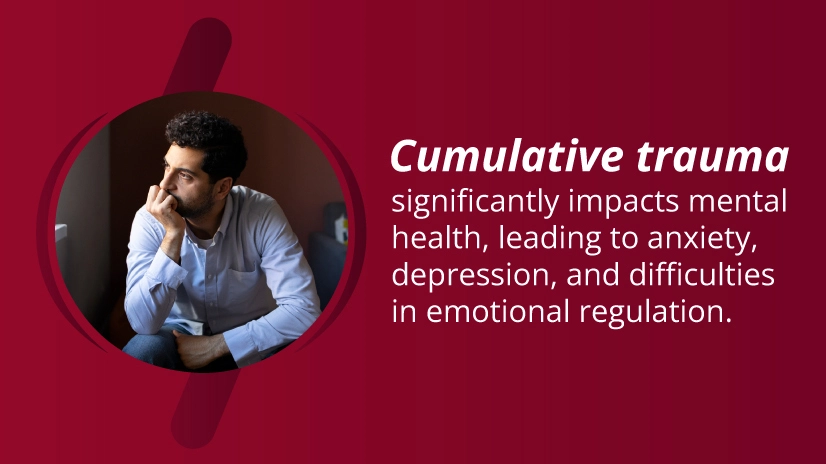
Cumulative Trauma: Insights for Mental Health
Clinically Reviewed by:
Cumulative trauma is a significant yet often ignored aspect of mental health that stems from the gradual buildup of stress and adverse experiences. These repeated traumas can lead to serious emotional challenges, affecting an individual’s ability to cope effectively.
This blog explores the impact of cumulative trauma on mental health, including anxiety, depression, and PTSD. It highlights the importance of understanding these challenges and discusses effective treatment options and coping strategies for recovery and resilience.
Key Takeaways
Cumulative trauma accumulates from repeated stressors, significantly impacting emotional health and coping abilities over time. This blog covers:
- Understanding the neuroscience behind cumulative trauma helps in developing targeted treatments for affected individuals.
- Effective coping strategies, including mindfulness and support systems, enhance resilience and emotional stability during recovery.
- Personalized and holistic treatment approaches address the unique needs of individuals affected by cumulative trauma.
Indiana Center for Recovery provides extensive services to help you overcome cumulative trauma and heal. Call us at (844) 650-0064 for more details.

Overview Of Cumulative Trauma
Cumulative trauma refers to the gradual buildup of stress and trauma over time. This can result from ongoing experiences like emotional abuse, neglect, or exposure to violence. Each small event can seem minor, but together, they can significantly impact a person’s mental health.
Individuals who experience cumulative trauma disorder (CTD) may struggle with anxiety, depression, or post-traumatic stress disorder (PTSD). These feelings often arise because the person has not processed each traumatic event. Instead, the weight of these experiences accumulates, making it harder to cope.
The Neuroscience Behind Cumulative Trauma
Cumulative trauma affects the brain’s structure and function over time. It can lead to heightened stress responses and changes in how the brain processes emotions. Understanding this helps develop treatments that target trauma-related alterations in the brain’s neural pathways.
How Cumulative Trauma Affects The Brain
Repeated trauma can change how the brain responds to stress. These changes can lead to increased anxiety and emotional difficulties. The brain’s ability to regulate emotions may weaken, making everyday stress harder to manage.
Stress Response And Trauma
Trauma impacts the brain’s stress response, causing heightened alertness. This can result in constant anxiety or fear, even without threats. Over time, the stress response becomes sensitive, affecting emotional and mental well-being.
Neuroplasticity And Recovery From Trauma
The brain’s ability to adapt, called neuroplasticity, aids trauma recovery. Therapy can encourage positive brain changes, promoting emotional healing. With time and treatment, neural pathways can strengthen, reducing trauma’s impact and restoring mental health.
The Psychological Impact Of Cumulative Trauma
Cumulative trauma can profoundly affect mental health over time. Repeated traumatic experiences increase stress, leading to anxiety or depression. For older adults and others, these effects can disrupt emotional balance, causing challenges in managing daily activities and maintaining healthy relationships.
Short-Term Mental Health Effects
Traumatic experiences can cause immediate distress, like anxiety and depression. These effects of cumulative trauma impact emotional well-being, leading to mood swings. For older adults and others, short-term reactions may include irritability, sleep issues, and difficulty concentrating on daily tasks.
Long-Term Mental Health Consequences
Cumulative trauma can lead to persistent mental health problems. Older adults and the general public may face ongoing anxiety, depression, or PTSD. These lasting effects of traumatic experiences can harm relationships, self-esteem, and the ability to enjoy daily life.
The Role Of Resilience And Vulnerability
Resilience and vulnerability determine how trauma affects mental health. Some manage traumatic experiences better, while others struggle deeply. Building resilience helps reduce the effects of cumulative trauma, especially in older adults and others, supporting long-term emotional stability.
Diagnosis And Assessment Of Cumulative Trauma
Diagnosing cumulative trauma requires examining physical health and emotional well-being. Healthcare professionals assess symptoms like chronic pain, muscle tension, and emotional distress. Substance use disorders may also be evaluated as they often relate to coping with trauma’s long-term effects on the body.
Recognizing Symptoms Of Cumulative Trauma
Symptoms of cumulative trauma include chronic pain, muscle tension, and mood changes. These symptoms may affect the body, leading to fatigue and irritability. Individuals may also struggle with substance use disorders, trying to numb emotional or physical pain linked to past trauma.
Tools And Methods For Assessment
Healthcare providers use interviews, questionnaires, and body-focused assessments to identify trauma. Evaluating physical health and chronic pain patterns helps in understanding trauma’s impact. Tools also include substance use screenings, aiding in recognizing maladaptive coping strategies linked to trauma’s effects.
Challenges In Diagnosing Cumulative Trauma
Diagnosing cumulative trauma can be challenging due to overlapping symptoms. Chronic pain and muscle tension may be mistaken for other health conditions. Substance use disorders further complicate diagnosis, as they often mask the trauma’s underlying impact on the mind and body.
Treatment And Intervention Strategies
Effective strategies for cumulative trauma focus on first responders and their type of trauma. Trauma-informed care guides mental health professionals in creating safe spaces. Tailored interventions consider individual experiences, providing comprehensive support for recovery from multiple traumatic incidents.
Psychotherapy Approaches
Mental health professionals use psychotherapy to help first responders process trauma. Common methods include cognitive behavioral therapy (CBT) and eye movement desensitization and reprocessing (EMDR). These approaches address the impact of cumulative trauma and foster healthy coping skills.
Pharmacological Interventions
Pharmacological interventions support first responders in managing trauma-related symptoms. Medications can help stabilize mood and reduce anxiety. Mental health professionals use these treatments as part of a broader, trauma-informed care approach.
Holistic And Alternative Therapies
Holistic therapies aid first responders in healing from cumulative trauma. Practices like mindfulness, yoga, and acupuncture focus on overall well-being. These alternatives complement traditional methods, enhancing the effectiveness of trauma-informed care strategies for various trauma types.
The Importance Of Support Systems
Support systems help individuals manage cumulative trauma by providing emotional aid. Having a network promotes resilience, reduces isolation, and encourages healthy coping. These systems empower individuals to face trauma’s challenges, leading to more effective healing and long-term recovery.
Role Of Family And Friends
Family and friends offer a safe space to express emotions. Their understanding and encouragement can reduce stress and build confidence. This emotional support fosters trust, helping individuals feel valued and connected during their healing journey.
Support Groups And Community Resources
Support groups and community resources create safe spaces for sharing experiences. These groups allow individuals to connect with others facing similar challenges. This mutual support reduces feelings of loneliness, fostering a sense of belonging and emotional strength.
Professional Support Networks
Professional support networks include therapists, counselors, and trauma specialists. They provide expert guidance, tailored treatment plans, and effective coping strategies. This specialized help addresses trauma’s impact, leading to improved emotional well-being and personal growth.
Prevention And Coping Strategies
Effective strategies can help prevent and manage cumulative trauma. These include building a strong support system and practicing self-care. Professional therapy and regular stress-relief activities can also help. Learning healthy ways to cope can reduce the impact of accumulated stress.
Building Resilience
Building resilience involves strengthening your ability to handle stress. This includes fostering strong social connections and developing problem-solving skills. Resilient individuals recover faster from challenges and maintain emotional stability, even in difficult situations.
Mindfulness And Stress Management Techniques
Mindfulness helps manage stress by focusing on the present moment. Techniques like deep breathing and meditation reduce anxiety and improve emotional control. Regular mindfulness practice can enhance one’s ability to cope with stressful situations.
Maintaining Mental Health Amidst Trauma
Maintaining mental health during trauma requires consistent self-care efforts. This includes prioritizing sleep, exercising regularly, and seeking professional and social support when needed. Developing a routine can bring stability, even when dealing with overwhelming situations.
Frequently Asked Questions (FAQ)
Cumulative trauma disorders happen because of repeated stress on muscles, tendons, and nerves. For example, carpal tunnel syndrome affects the wrist and often results from typing too much. Tendonitis is another disorder that causes pain in the tendons, usually in the shoulders, elbows, or wrists.
Tennis elbow leads to pain and weakness in the elbow joint and develops from repeated movements. These problems can come from daily activities like typing, lifting, or using tools. Poor posture during work or everyday tasks can also increase the risk. Common symptoms include pain, stiffness, and reduced flexibility.
Early treatment is essential to prevent more severe injuries, including rest, physical therapy, and ergonomic adjustments.
Cumulative trauma happens when people experience many stressful events over time. These events can include physical or emotional abuse, accidents, or losses. Each event adds to the last, making emotional pain and distress even stronger.
As a result, individuals may feel overwhelmed, anxious, or depressed. This buildup can harm their relationships and affect their daily lives. If left untreated, cumulative trauma can lead to severe mental health disorders.
Healing from cumulative trauma usually requires therapy and support. Professional help can guide people through their feelings and experiences. Recognizing cumulative trauma’s effects on recovery and better overall well-being is essential.
Cumulative trauma occurs when a person experiences multiple traumatic events over time. This can include events like abuse, neglect, or loss. Each new trauma adds to the stress, making it harder to cope.
As a result, individuals may develop anxiety, depression, or PTSD. They might feel overwhelmed and struggle with everyday tasks. Emotional responses can become intense, leading to mood swings or irritability.
Moreover, cumulative trauma affects relationships and social connections. People may withdraw from friends or family due to fear or shame. This isolation can worsen their mental health, creating a cycle that’s difficult to break.






 100% Confidential
100% Confidential